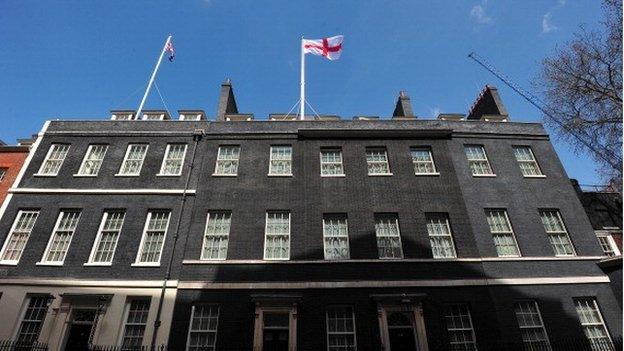Election 2015: PM sets out 'English votes' timetable
- Published
David Cameron: "We do not support English nationalists"
Proposals for "English votes for English laws" would be in place for the first Budget of a Conservative government, David Cameron has said.
He pledged an "English rate of income tax" - although it could apply in Wales and Northern Ireland - once more powers are devolved to Scotland.
The Conservatives want to give MPs for English seats a veto on issues which only affect England.
Labour's Harriet Harman criticised the "back of an envelope" proposals.
Ms Harman, Labour's deputy leader, said change was needed but that it should be worked out on a cross-party basis.
'Resentment festers'
Mr Cameron said that unless the current rules are changed: "English MPs will be unable to vote on the income tax paid by people in Aberdeen and Edinburgh, while Scottish MPs are able to vote on the tax you pay in Birmingham or Canterbury or Leeds.
"It is simply unfair. And with English votes for English laws we will put it right.
"Because if you have basic constitutional unfairness like we've had, if you have the people in one part of the UK feeling like they are getting a raw deal, then resentment festers, and that undermines the bonds and the fellow-feeling that are the basis of the United Kingdom."
Standing alongside his cabinet colleague William Hague, he insisted that the policy "isn't some purist, over-neat solution that ends up creating more problems in the long run".
He said changing the rules to introduce "English votes for English laws" was not an easy thing to do, but said the "real threat" was not acting as more powers were devolved to Holyrood.

Analysis
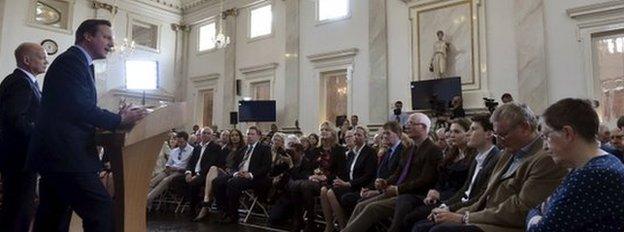
By BBC campaign correspondent Jonny Dymond
David Cameron says that he has solved "one of the great conundrums of our time".
But for some, seeing the Conservative and Unionist Party suggest fracturing the House of Commons into Scottish, English and maybe Welsh factions is more of a paradox.
But the proposal works for the Conservatives in several ways.
It makes good on the promise that David Cameron made in the morning after the Scottish referendum. It is meant to play well in UKIP-leaning constituencies by showing that the Conservatives care about the grievances of the English. And of course it handily highlights the fact that should Labour go into government it may be "propped up" by Scottish votes - if the opinion polls are to be believed, those of the SNP.
And for the Conservatives, reminding voters of the SNP's possible role in a future Labour government cannot be done too many times.

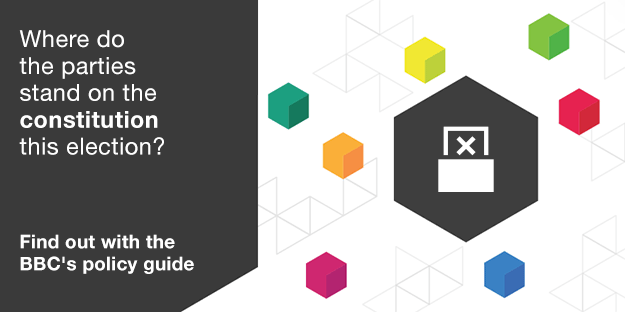
Under the Conservatives' proposals, the line-by-line scrutiny of new bills would be reserved for MPs from the nations affected by the legislation.
A new grand committee of all English MPs - or English and Welsh MPs where appropriate - would also have to approve any legislation relating only to England.
Mr Cameron promised firm proposals within 100 days of forming a government, which would be "fully implemented" by the time of the Budget in March of the following year.
'English-only issues'
As it stands Scotland is being given the power to set its own income tax rates and bands - and Air Passenger Duty rates - under increased devolution proposals drawn up by the Smith Commission, external in the wake of the independence referendum last year.

The view from Scotland
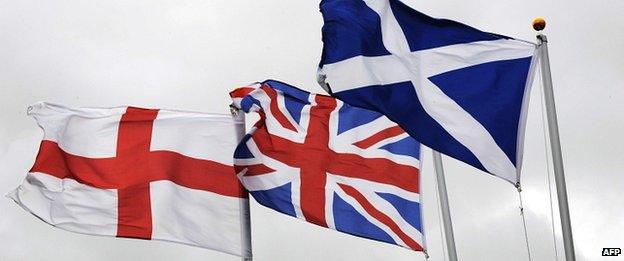
By Brian Taylor, BBC Scotland political editor
Is David Cameron motivated by electoral reasons? You bet he is. But, then, this is an election. Politicians of every hue are seeking issues which will attract voters to their side - and cause them to shun the other lot.
Mr Cameron makes two calculations. One, that an emphasis upon English voting rights may undermine the appeal of UKIP south of the Border.
And, two, that spotlighting the constitution might tend to bolster the SNP in Scotland to the disadvantage of the Labour Party. For a Tory leader, what's not to like?

The commission said income tax will remain a shared tax, and both the UK and Scottish Parliaments will share control of it, and it says "MPs representing constituencies across the whole of the UK will continue to decide the UK's Budget, including income tax".
SNP leader Nicola Sturgeon told the BBC she believed the new Tory policy would be a direct breach of the commission, and it showed the "growing desperation" of the Conservative campaign.
She said if there were matters that were genuinely English only, that had no impact in Scotland, there would be "a strong case" for Scottish MPs not voting on them.
"The problem is there's a lot of issues characterised as English-only issues that are anything but - matters relating to the English health service for example.
"Decisions taken on that have a direct impact on Scotland's budget," she said.
Ms Sturgeon is referring to the system used to allocate funds to devolved governments. These sums are dictated - via the Barnett formula - by the figure allocated to services such as health and education in England.
'In addition'
But Mr Hague told the BBC his party's new policy was simply adding an extra stage to the legislative process in the Commons.
He said: "All MPs [across the UK] would continue to vote on and discuss all matters that come before the House of Commons.
"All we're saying is that if something only affects England then in addition of being discussed in the whole of the House of Commons, to come into law, it has to have the approval specifically of the English MPs, or the English and Welsh MPs.
"It is an addition to our current arrangements, and isn't excluding Scotland from anything, and therefore it is entirely consistent with what we've signed up to in the Smith Commission."
Plaid Cymru's Jonathan Edwards said in principle his party was "in favour" of English votes for English laws.
"But for [the system] to work there must be equality of powers amongst the nations, else we risk a shambolic situation," he added.
BBC political correspondent Carole Walker added the Conservatives rejected suggestions they were "stirring up resentment between different parts of the UK", which had been made earlier in the week by former Prime Minister Gordon Brown.
Labour says the issue should be considered along with other potential changes by a constitutional convention after the election.
While, the Liberal Democrats favour a grand committee of English MPs, with the right to veto legislation applying only to England, with its members based on the share of the vote.
* Subscribe to the BBC Election 2015 newsletter to get a round-up of the day's campaign news sent to your inbox every weekday afternoon.
- Published24 April 2015
- Published3 February 2015
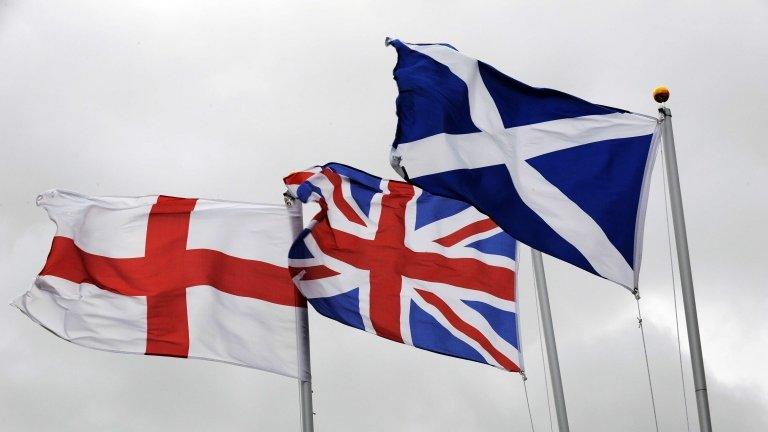
- Published3 February 2015
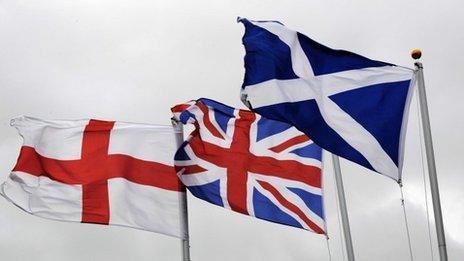
- Published14 October 2014
